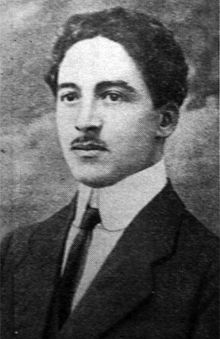Alexandru Nicolau
| Alexandru Nicolau | |
|---|---|
 |
|
| Born | January 1889 Bucharest |
| Died |
September 27, 1937 (aged 48) Moscow |
| Nationality | Romanian, Soviet |
| Occupation | lawyer |
Alexandru Nicolau (Russian: Александр Александрович Николау; January 1889 – September 27, 1937) was a Romanian lawyer, socialist and later communist activist. Active in the Romanian and French socialist movements before and during World War I, he left for Russia during the 1917 Revolutions. There, he became one of the organisers of Romanian volunteer detachments in support of the Soviets. Arrested shortly after returning to Romania in 1920, he left for Soviet Russia after a successful prison escape. During the later part of his life he held teaching positions at several Soviet universities, before falling victim to the Great Purge in 1937. His name was posthumously rehabilitated both in the Soviet Union and in his native Romania.
Nicolau was born in Bucharest in 1889. As a student at the Saint Sava High School, he befriended Constantin Titel Petrescu and Mihail Cruceanu, both of whom would later become known as socialist militants. After finishing his secondary education, Nicolau trained as a lawyer, receiving a degree from the local University, a PhD in Paris, before being admitted to the Bucharest Bar. His first contacts with the Romanian socialist movement, still in disarray during that period, came through his membership in the Bucharest's Study Circle of the Socialist Students between 1908 and 1909. Soon after he began writing for România Muncitoare, the main socialist press venue. One of his first notable contributions was his correspondence from Italy, criticising the reformist stance of the local socialist party. In 1911, România Muncitoare published Nicolau's anti-militarist manifesto To the recruits. Recalling the army's contribution in suppressing the 1907 Peasants' revolt, the brochure called on the new recruits to choose a different path and refuse to support the government crackdown on the demands of the workers and the peasant. As a result, in May 1912 he was put under trial before the Court of the Ilfov County, where he reaffirmed the ideas expressed in the manifesto. Defended by fellow socialists Mihail Gh. Bujor, Toma Dragu and Titel Petrescu, and by socialist sympathizer Constantin Mille, Nicolau was eventually acquitted by the jury. In June 1912, along with Constantin Dobrogeanu Gherea, Ecaterina Arbore and others, he represented the Bucharest Socialist Club at the Fifth Congress of the Social Democratic Party of Romania (PSDR), being elected a member in the committee of the party's publishing house. In order to escape harassment from the authorities, Nicolau chose to leave Romania for Paris, where he continued his law studies at the Sorbonne, and joined the French Section of the Workers' International.
...
Wikipedia
